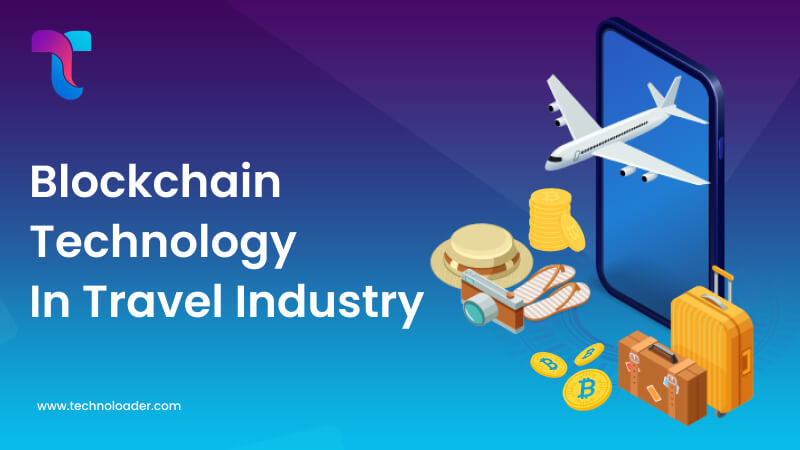The travel industry has always been a fast-moving sector, and it is constantly adapting to new technologies to improve customer experience and operational efficiency.
In 2025, blockchain technology is now emerging as one of the most transformative forces in the travel industry. It is redefining the way in which we book flights, verify identities, and handle cross-border payments. Also, blockchain in the travel industry is now tackling long-standing issues like fraud, fragmented data systems, and more.
The blockchain market in the travel and tourism sector is expected to grow at a CAGR rate of 38.5% between 2021 and 2026 and will reach $2,459 million by the end of 2026. This rapid growth highlights the industry’s confidence in blockchain’s ability to revolutionize travel experiences for both businesses and consumers.
Are you looking to learn more about it? Well, that’s what this blog is all about! In this, we’ll explore the key ways blockchain is transforming the travel landscape in 2025 and what it means for the future of global tourism.
Let’s have a look!
Table of Contents
- 1 Understanding Blockchain Technology
- 2 Benefits of Blockchain in Travel
- 3 Key Use Cases of Blockchain in the Travel Industry
- 4 Real-World Companies and Blockchain Projects in Travel
- 5 Challenges & Considerations of Blockchain Adoption in the Travel Industry
- 6 The Future of Blockchain in the Travel Industry
- 7 Conclusion
Understanding Blockchain Technology
If you are a newbie, blockchain technology may sound a little confusing to you. But it is simple to get a grip on it. Basically, it is a list of records, also known as a distributed ledger, wherein transactions between parties are listed and stored securely. Each record, known as a ‘block’, is secured using cryptography.
One of the key benefits of blockchain is that the data is decentralized and information is shared across a peer-to-peer network. Each block contains information related to transactions, and these can’t be modified or erased.
The decentralized, permanent, and unmodifiable nature of the data recorded on the blockchain makes it more secure and transparent. And there’s no central point of failure, and no one can modify or tamper with the data.
Benefits of Blockchain in Travel
As blockchain continues to reshape the travel sector in 2025, it brings in a wide range of benefits for both businesses and travellers. The following are some of them:
Transparency & Trust
Blockchain helps in the creation of decentralized travel platforms that bring complete transparency to the travel industry. Every transaction, from flight bookings to hotel reservations, is recorded on a public or permissioned blockchain, which ensures that data can’t be altered or tampered with. This transparency builds trust among travellers and service providers and even reduces the risk of scams, false bookings, or hidden fees.
Cost Reduction for Service Providers & Users
One of the main benefits of blockchain in the travel and tourism sector is its ability to eliminate intermediaries such as banks, payment processors, and third-party booking platforms. By enabling direct transactions between users and service providers, blockchain reduces fees and overhead costs. As a result, operational costs get reduced for businesses, and travellers get more competitive pricing.
Enhanced Data Security
Blockchain technology ensures that personal data of travellers, such as identity, payment details, and travel history, is stored securely using advanced cryptographic techniques. Because blockchain uses a decentralized ledger, it is vulnerable to hacking or data breaches. This gives both travellers and businesses peace of mind regarding data privacy and protection.
Improved Customer Experience
With quick processes and more secure transactions, blockchain enhances the overall travel experience. Smart contracts in travel automate bookings, check-ins, and refunds, which reduces delays and manual errors. Also, loyalty programs become more flexible and rewarding, which allows travellers to use their earned points across various platforms seamlessly. This results in a smoother, more personalized, and more efficient travel journey.
Key Use Cases of Blockchain in the Travel Industry
Blockchain isn’t just a buzzword now; it is actively reshaping how the travel industry operates in 2025. The below-mentioned are some important use cases of blockchain in travel that are delivering real-world value:
Decentralized Travel Booking Platforms
Blockchain-based platforms such as Travala, Winding Tree, and LockTrip are eliminating the need for traditional booking intermediaries. These decentralized travel platforms allow travellers to book flights and hotels directly with service providers. This benefits both travellers and service providers, like lower booking fees, transparent pricing, and direct communication.
Secure & Seamless Traveller Identity
With blockchain, one can seamlessly create digital passports and security identity records where travellers can store their copies of identification documents, visas, vaccination certificates, and more. Also, they can share access securely with airports, hotels, and immigration officials. This streamlines border control, airport check-ins, and hotel registrations, which makes travel smoother and reduces identity fraud and delays at checkpoints.
Smart Contracts for Transparent Transactions
Smart contracts automate agreements between travellers and service providers without the need for intermediaries. Be it booking a hotel room, renting a car, or reserving an activity, terms are executed automatically based on predefined conditions. This helps prevent disputes over cancellations, refunds, or services not delivered. For example, if a hotel reservation is cancelled within a set timeframe, a smart contract can automatically process a refund.
Loyalty & Rewards Programs
Traditional loyalty programs are often confusing and restrictive. But, with blockchain technology, you can enable tokenized loyalty systems that allow users to earn, store, and redeem rewards across multiple platforms. This brings in greater flexibility, transparency, and utility. And points or tokens earned can be used across airlines, hotels, and travel agencies.
Crypto Payments & Cross-Border Transactions
Blockchain technology enables crypto payments for travel. This eliminates currency conversion fees and banking delays, which is especially useful for international travellers. Also, the platforms like Travala already support over 50 cryptocurrencies that allow users to book hotels, flights, and tours entirely with crypto. This enables faster, cheaper, and more secure payment methods.
Luggage Tracking and Baggage Claims
Lost or mishandled luggage is a frequent issue in global travel. By tracking it on a blockchain, airlines and airports can offer real-time and transparent tracking across multiple handlers and transit points. This ensures greater accountability and can simplify baggage claim processes by automating verifications and ownership records. Also, it reduces delays and traveller frustration.
Real-World Companies and Blockchain Projects in Travel
Now, we can say that blockchain is no longer a concept for the future; several forward-thinking travel companies have already integrated it into their core operations. Have a look at some examples that are leading the charge in 2025!
Winding Tree: A B2B Travel Marketplace
Winding Tree is a decentralized B2B travel marketplace that removes the need for third parties. Airlines, hotels, and travel agencies can connect directly, and they can offer lower costs, increased efficiency, and full transparency to travellers. By using blockchain technology to manage inventory and contracts, Winding Tree gives providers complete control over their offerings.
Travala: Crypto-Powered Travel Booking
Travala is one of the famous platforms that enables users to book hotels, flights, and activities using cryptocurrencies. It supports over 50 digital currencies, such as Bitcoin, Ethereum, and stablecoins, and offers a seamless booking experience. Travala is one of the best blockchain travel solutions that ensures secure transactions and tamper-proof reviews, thus building trust among its global user base.
TUI Group and Webjet: Blockchain-Based Inventory & Booking Management
If you are a travel enthusiast, you might know TUI Group and Webjet. They have adopted blockchain to enhance inventory and booking management. TUI uses its in-house blockchain platform that helps manage hotel inventory in real-time. Similarly, Webjet helps detect booking issues and settlement errors between partners, which reduces manual work and improves efficiency.
TravelChain: Decentralized Data Exchange For Travellers
TravelChain is a blockchain-based platform in the tourism sector that focuses on decentralized data sharing between travellers and service providers. By storing travel histories, preferences, and identities on the blockchain network, users can choose what data to share and with whom. This gives travellers control over their information without compromising privacy.
Challenges & Considerations of Blockchain Adoption in the Travel Industry
While blockchain technology offers great potential to transform the travel and tourism industry, its widespread adoption still faces some challenges, such as:
Adoption Barriers in the Traditional Travel Ecosystem
Most of the players in the travel industry still operate on traditional systems and manual work. Shifting to blockchain-based platforms not only requires financial investment but also a great amount of learning. Travel agencies, airlines, and hotel chains that are already using traditional systems may hesitate to adopt blockchain-based systems, especially when the ROI isn’t always immediate or measurable.
Regulatory & Legal Issues
The decentralized nature of blockchain technology poses several regulatory challenges, especially in a global industry like travel. Additionally, data protection laws and varying regional standards create a complex legal landscape. Governments are still catching up to the capabilities of blockchain, which leads to uncertainties about compliance, taxation, identity verification, and cross-border data handling.
Technical Complexity & Integration
Implementing blockchain solutions requires specialized knowledge and technical expertise, which many travel companies currently lack. Integrating blockchain with existing systems like booking engines, CRM platforms, or global distribution systems can be a complex and resource-intensive process. Moreover, scalability and interoperability between different blockchain platforms remain key concerns, especially for global applications that involve multiple stakeholders.
The Future of Blockchain in the Travel Industry
As we move further into 2025, blockchain is set to play an integral role in redefining the travel experience, from how we book trips to how identities, payments, and rewards are managed across the globe. Experts within the industry predict substantial growth in blockchain-based travel services, with capital investment and startup activity rising in this space.
Other than that, a new wave of digital tourism is rising with metaverse experiences, where travellers can explore destinations virtually before making real-world bookings. Another trend is the integration of AI with blockchain, where AI boosts personalization and predictive travel analytics, and blockchain ensures data integrity and security. Together, they’re creating smarter, more responsive travel ecosystems.
Conclusion
As we move deeper into 2025, it’s clear that blockchain technology is no longer just a buzzword—it’s becoming a foundational pillar in the travel industry. From streamlining identity verification to enhancing payment security, blockchain is solving long-standing challenges.
You might have noticed that some companies like Travala, TUI Group, and Winding Tree have already integrated blockchain technology into their systems and have achieved positive results.
If you are one of those who are looking to leverage the power of blockchain in travel or beyond, Technoloader stands as the best!
We are known as the leading blockchain development company that can help you integrate blockchain into your travel operations. With expertise in Web3, AR/VR, decentralized applications, and next-gen software solutions, we are helping organizations around the world build smarter, more secure, and scalable digital futures.
So, connect with us today, and let’s together bring a shift in the travel industry!






